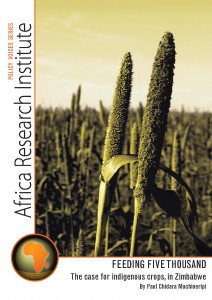In this Policy Voice, Chidara Muchineripi, a management consultant from Harare, argues that indigenous crops should play a more important role in African agriculture. Chidara, who is next in line for the chieftainship of the semi-arid district of Gutu, built a consensus amongst local people in favour of growing traditional crops, namely finger millet, pearl millet and sorghum. Traditional crops are scarcely grown in Gutu, with local people favouring commercial crops introduced during the colonial era.
Indigenous crops, he argues, have a number of advantages over the regions staple crop, maize. Most importantly, traditional crops adapt well to different climates and produce higher yields in regions of low rainfall. They require fewer expensive inputs and can be stored for longer periods. Seven villages in the Chinyika communities have been growing indigenous crops for the past three years. Over 5,000 people now have food adequate supplies and a steady cash income from the sale of their surplus crop.
Chidara makes a strong case for policy makers to take local knowledge seriously. But there is no room for nostalgia in these pages. Modern farming innovations have an equal role to play. This Policy Voice argues strongly in favour of developing more productive seed varieties, teaching rural communities improved farming techniques and encouraging farmers to grow a range of crops. Fostering change in rural Africa will require a combination of local knowledge and modern innovations.
Download the full Policy Voice:







